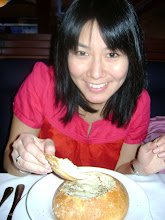
In Japanese there is a term for food that Japanese men love ... "Otoko ryori" ... which literally means "Men's food". If you can cook any item if not every item on this list, you will make a Japanese man very happy! Men love home cooked food. Standard food on this "otoko ryori" list is Curry, Tonkatsu (Bread and deep fried pork cutlet), Ramen, and ... NIKUJAGA ... Nikujaga translates to Meat and Potatoes. I remember reading somewhere that Japanese tried to make Beef Stew and came up with Nikujaga.
My boyfriend, being a Japanese male, adores Nikujaga. I recently made a huge pot of nikujaga. I am very glad that I ate my portion and packed my own lunch before he came back from the bar. He didn't eat dinner, so he devoured a good 2 quart container of nikujaga at 2am. He insisted it was delicious. Though, since he basically inhaled it, I'm not very sure if he tasted any of it.
Nikujaga Recipe
1 lb thinly sliced beef
2 lbs potatoes, peeled and cut into 2 inch chunks
2 small onions, thickly sliced
15 baby carrots
50g harusame (glass noodles)
cold water
hondashi granules
soy sauce
sugar
mirin
sake
roasted sesame oil
cooking oil
1 lb thinly sliced beef
2 lbs potatoes, peeled and cut into 2 inch chunks
2 small onions, thickly sliced
15 baby carrots
50g harusame (glass noodles)
cold water
hondashi granules
soy sauce
sugar
mirin
sake
roasted sesame oil
cooking oil
Saute the onions in oil over medium high heat in a large pot until softened. Add thinly sliced beef, sprinkle about a teaspoon hondashi granules and a teasoon of soy sauce. Cook until browned.
Add potatoes and enough water to cover potatoes. Keep heat at about medium to medium high, we want the potatoes to heat and then cook evenly. If you have the heat too high, the outside of the potatoes will cook and melt before the inside is cooked. Season the water with approximately another 3-5 T of hondashi (the correct amount of the amount of water added to the pot), 2 T soy sauce, 3-5 T of sugar, 2 T mirin, 1 T mirin, and 2 T of roasted sesame oil. Taste the cooking liquid. It should be fairly aggressively salty and sweet, since the meat and potatoes will absorb alot of the flavor. Adjust taste according to liking. I actually never measure these ingredients, so these are approximations. The most important thing with cooking is to taste your food as its being made. Add carrots after the broth is seasoned. Since the carrots are smaller than the potatoes, it will cook mush faster. You don't want mushy carrots.
Skim any foam that arises. The nikujaga is done is when the potatoes are done cooking. Pierce the potatoes with a sharp knife to check for doneness. Turn off heat and add the harusame glass noodles into the broth. Allow it to soften and absorb the sauce for about 15 minutes before serving.
Add potatoes and enough water to cover potatoes. Keep heat at about medium to medium high, we want the potatoes to heat and then cook evenly. If you have the heat too high, the outside of the potatoes will cook and melt before the inside is cooked. Season the water with approximately another 3-5 T of hondashi (the correct amount of the amount of water added to the pot), 2 T soy sauce, 3-5 T of sugar, 2 T mirin, 1 T mirin, and 2 T of roasted sesame oil. Taste the cooking liquid. It should be fairly aggressively salty and sweet, since the meat and potatoes will absorb alot of the flavor. Adjust taste according to liking. I actually never measure these ingredients, so these are approximations. The most important thing with cooking is to taste your food as its being made. Add carrots after the broth is seasoned. Since the carrots are smaller than the potatoes, it will cook mush faster. You don't want mushy carrots.
Skim any foam that arises. The nikujaga is done is when the potatoes are done cooking. Pierce the potatoes with a sharp knife to check for doneness. Turn off heat and add the harusame glass noodles into the broth. Allow it to soften and absorb the sauce for about 15 minutes before serving.











2 comments:
though i'm not a japanese nor a man, if someone cooks this dish for me, i'd be very happy too!
Thanks lululu for the comment! This was actually my first comment ever on my blog!
Post a Comment